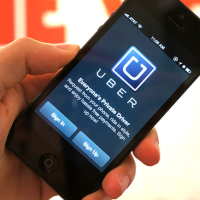Ride-Sharing Companies Defy CPUC, Continue to Service Airports without Permits

Ride-sharing startup Uber was valued by venture capitalists this week at $17 billion, twice that of Hertz and Avis combined, and is testing that newfound market heft by defying the state Public Utilities Commission (CPUC) and continuing to service customers at airports without proper authorization.
Last September, when California became the first state to issue regulations governing the app-driven, ride-on-demand companies popping up across the country, Uber, Lyft, Sidecar and others reluctantly agreed to obtain permits from individual airports before letting their employees cruise there for customers.
They have not done that.
After meeting with law enforcement from five major California airports last week, the PUC sent a letter (pdf) to ride-sharing companies―but singled out Uber as the main culprit―warning them that they were in violation of multiple rules and in danger of losing their permits to operate.
The agency specifically alleged that drivers for the TNCs (Transportation Network Companies, for lack of a better term) were exchanging permits between each other, lacked proof of insurance, lacked valid driver’s licenses and did not display proper “trade dress” on their vehicles.
But most importantly, not one company had obtained permits from the airports, as required by PUC rule 13-09-045: “TNCs shall not conduct any operations on the property of or into any airport unless such operations are authorized by the airport authority involved.”
Uber issued a measured response that it had spent “countless hours with airport managers and their staff” to “develop requirements that are aligned with CPUC regulations and embrace the spirit of ridesharing,” and that the agency was just mucking things up by getting involved.
The company sent out a slightly more bellicose response earlier in the week when the CPUC issued a proposed ruling that it was going to greatly expand TNC insurance responsibility. It would bump up maximum liability from $100,000 to $1 million, make the company liable when a driver turned on the smartphone app (not when a driver accepts a ride) and would make the company insurance primary (it would kick in before the driver’s personal insurance).
The startups, which claim to simply be app developers, not transportation services, have built their innovative and lucrative business model on avoiding taxes and overhead while skirting laws governing the taxi industry and businesses in general.
Local and state authorities are a ways away from coming up with a comprehensive regulatory framework for ensuring fair rates, insurance, safety, reliability and fairness while not illegally impairing the application of new technology. While they continue to sort things out, the courts are now weighing in on an industry that didn’t exist two years ago.
The response from Uber Communications Director Eva Behrend made a pitch for the troglodyte commission to recognize that the world has changed and it should get out of the way:
“Uber will vigorously defend the rights of California riders and drivers to enjoy the competition, choice, reliability and safety that ride sharing affords the Golden State. At a time when California desperately needs job creation initiatives rather than industry-destroying bureaucracy, we look to the leaders of our state to ensure that the innovation economy doesn't crumble at the hands of special interests.”
–Ken Broder
To Learn More:
Ride-Shares Warned By Regulators: No Airport Runs Carolyn Said, San Francisco Chronicle)
California Regulators' Crackdown Bars Uber, Lyft, Sidecar from Airports (by Patrick Hoge, San Francisco Business Times)
State to Consider New Insurance Laws for Ride-Sharing Companies (by Carolyn Said, San Francisco Chronicle)
Uber, Lyft Hit by Proposed California Insurance Requirements (by Patrick Hoge, San Francisco Business Times)
Latest Sign the Tech Bubble's Really Here: Uber Valued at $17 Billion (by Michael Hiltzik, Los Angeles Times)
Fight over Ride-Share Companies, like Lyft and Uber, Shifts to Courts (by Ken Broder, AllGov California)
- Top Stories
- Controversies
- Where is the Money Going?
- California and the Nation
- Appointments and Resignations
- Unusual News
- Latest News
- California Forbids U.S. Immigration Agents from Pretending to be Police
- California Lawmakers Urged to Strip “Self-Dealing” Tax Board of Its Duties
- Big Oil’s Grip on California
- Santa Cruz Police See Homeland Security Betrayal in Use of Gang Roundup as Cover for Immigration Raid
- Oil Companies Face Deadline to Stop Polluting California Groundwater





